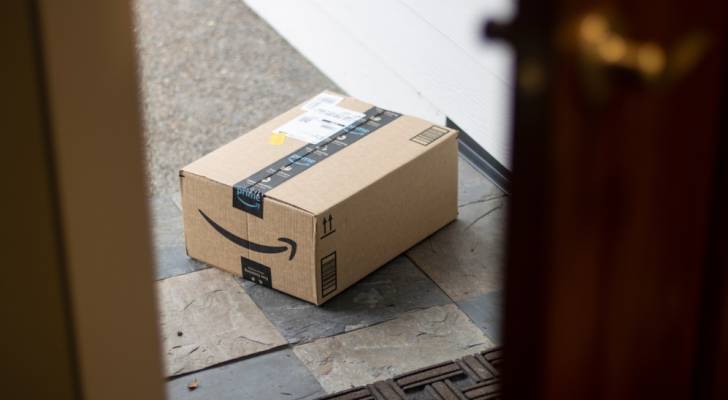
Have you ever had a package go missing but still had to pay for it? Have you ever disagreed with a retailer if they should give you a refund? Well, a new ruling from the Consumer Protection B.C. (CPBC) is shedding light on who exactly is responsible in these sorts of scenarios.
After a B.C. resident’s Amazon order was never delivered, the customer brought forward the mistake to Amazon, requesting a refund. It was denied, according to CBC News (1) — the customer then complained to the CPBC about the issue. After a ruling on October 14, the retail giant was ordered to pay a $10,000 administrative penalty, nearly $9,400 in inspection and legal costs, as well as refund the customer their purchase costs, a summary (2) of the ruling stated.
Amazon confirmed that staff delivered the package to “someone” at the customer’s home, CBC News uncovered, but who that person is remains a mystery — the customer claimed neither they nor their roommates received the package.
Don’t Miss
- Want to retire with an extra $1.3M? See how Dave Ramsey’s viral 7-step plan helps millions kill debt and build wealth — and how you can too
- A new nationwide survey of financial leaders warns Canada may face a recession in six months — protect your wallet with these 6 smart money moves ASAP
- Boomers are out of luck: Robert Kiyosaki warns that the ‘biggest crash in history is coming’ — here’s his strategy to get rich before things get worse
Why Amazon claimed it was ‘return abuse’
To counter allegations, Amazon claimed that the customer had requested multiple refunds in other instances, totaling $300, the ruling stated. The retailer stated this evidence, along with the high cost of the item to be refunded, was proof the client was engaging in ‘return abuse’: receiving an item but then claiming it was not delivered.
Amazon further claimed that they had taken all appropriate measures to confirm the package was delivered, by using GPS tracking and delivery notes, where applicable. No photo evidence was available. The retailer also confirmed their methods were aligned with the information on the CPBC’s website and in line with their own terms and conditions.
Amazon has 30 days to appeal the decision.
Who is responsible for missing packages?
While Amazon might have some evidence in their favour, B.C.’s consumer protection regulator was not satisfied.
By relying on principles taken from the Supreme Court of Canada on consumer protection legislation and how it is interpreted, the regulator came to a much different conclusion.
“I am not satisfied that the word ‘deliver’ or more appropriately the phrase ‘delivered to a consumer’ as is constructed under section 49 of the BCPA [British Columbia Consumer Protections Act] should be construed to permit a supplier to leave goods with another person at the delivery address provided by the consumer…unless expressly agreed to by the supplier and consumer,” the ruling stated.
The ruling also noted the same approach applies to goods left at a delivery address, or on the front step of another person’s home. This has major implications for British Columbians that are victims of package theft. If the supplier never properly delivered the package to them personally, or someone mutually agreed upon, the consumer could have a case for a refund if their package was stolen.
Read more: Here are 5 expenses that Canadians (almost) always overpay for — and very quickly regret. How many are hurting you?
What to do if your package goes missing
With the busy holiday commerce season fastly approaching, online orders may begin showing up at your doorstep. Here’s what you should do if one goes missing.
- File a police report. Amazon or another online retailer may need a police report to begin their refund process. You should contact the authorities as soon as you confirm your package is indeed stolen.
- Contact the retailer. Don’t hesitate to contact the retailer as soon as you can so they are aware. You may need to provide them with an official cancellation form from the CPBC, and the seller has 15 days to refund you per the regulator (3).
- Request a credit card charge reversal. If the retailer refuses to refund your order, the CPBC recommends contacting your credit card company to request the charges on your card be reversed or cancelled.
- Contact consumer protection agencies. If nothing works, it might be time to contact the CPBC or the consumer protection agency in your province/territory. They can help you get to the bottom of the issue.
With porch pirates becoming more of an issue as contactless delivery becomes the norm, British Columbians might be concerned what their rights are in case of a failed delivery. As this recent CPBC ruling shows, consumers have ample protections in case of a delivery gone wrong.
What To Read Next
- Ray Dalio just raised a red flag for Americans who ‘care’ about their money — here’s why Canadians should limit their exposure to U.S. investments
- The ultra-rich are pulling back on volatile stocks right now, warns investing legend — here are the 4 assets they’re using to help shield their millions
- I’m almost 50 and don’t have enough retirement savings. What should I do? Don’t panic. Here are 6 solid ways you can catch up
- Here are the top 7 habits of ‘quietly wealthy’ Canadians. How many do you follow?
Article sources
We rely only on vetted sources and credible third-party reporting. For details, see our editorial ethics and guidelines.
CBC News (1); CPBC (2); CPBC (3)
This article provides information only and should not be construed as advice. It is provided without warranty of any kind.